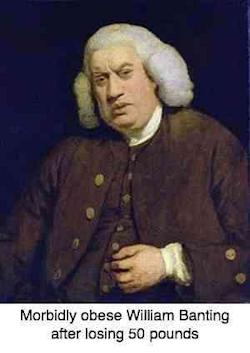The Banting Diet
The Banting Diet is named after William Banting, a prominent English undertaker who lived in the 19th century. The Englishman’s self-published work, "Letter on Corpulence, Addressed to the Public" was the world’s first dieting book and documented the diet that led to his dramatic weight loss.
 The Real Meal Revolution has used advances in nutrition and medical understanding since then, to design a modern diet, firmly based on scientific research about human nutrition.
The Real Meal Revolution has used advances in nutrition and medical understanding since then, to design a modern diet, firmly based on scientific research about human nutrition.
It is very important to understand WHY  the Banting Diet should exist at all. In the Real Meal Revolution, we discuss insulin resistance (IR) and the
the Banting Diet should exist at all. In the Real Meal Revolution, we discuss insulin resistance (IR) and the  metabolic syndrome (MS) in great in detail.
metabolic syndrome (MS) in great in detail.
Left unchecked, IR and MS lead to  Type 2 Diabetes Mellitus, high blood pressure, coronary heart disease and obesity among other things. Banting was developed specifically to combat these symptoms.
Type 2 Diabetes Mellitus, high blood pressure, coronary heart disease and obesity among other things. Banting was developed specifically to combat these symptoms.
William Banting: Letter on Corpulence
 In 1862. William Banting visited noted surgeon William Harvey, about his excessive weight.
In 1862. William Banting visited noted surgeon William Harvey, about his excessive weight.
Banting had tried everything commonly suggested in his day. Exercise, fasting, purgatives, restricting his calories, and nothing worked.
Harvey prescribed a diet he had heard about in France. The recommended diet was mainstream medicine in Europe, but not yet in the UK.
It worked so well that, in 1864, Banting published a 16 page pamphlet,  "Letter on Corpulence, Addressed to the Public," describing the diet and his experience using it.
"Letter on Corpulence, Addressed to the Public," describing the diet and his experience using it.
Banting's Diet.
Meat, fish, and poultry, with no limitation on animal or dairy fats.
Small portions of low sugar fruits, and small pieces of toast.
Zero, sugar, sweets, or starchy foods. No beer.
Wine and spirits were allowed.
Dr Wilhelm Ebstein

Photo Credit: Nicola Perscheid - http://ihm.nlm.nih.gov/images/B07739
Adoption of Banting's Diet
Banting's diet was included in the medical text-book "The Principles and Practice of Medicine," by Sir William Osler, then a physician at Johns Hopkins (1892).
 German physician Dr Wilhelm Ebstein was critical, but took it back to Europe. His research into obesity, and gout identified the importance of fat in the diet.
German physician Dr Wilhelm Ebstein was critical, but took it back to Europe. His research into obesity, and gout identified the importance of fat in the diet.
Wilhelm Ebstein, is really the father of the high-fat, low-carbohydrate diet, after realising that the key was replacing carbohydrates with fat, not protein, as fat reduced hunger more effectively.
German and Austrian scientists were the leading researchers in nutritional science in the world until WWII. After the war, their knowledge was ignored and led by American propaganda and political decisions, nutrition was over-taken by a non-scientific fad focused on reducing saturated fat in the diet. This idea never had any scientific basis.
 In 1862. William Banting visited noted surgeon William Harvey, about his excessive weight.
In 1862. William Banting visited noted surgeon William Harvey, about his excessive weight.![]() "Letter on Corpulence, Addressed to the Public," describing the diet and his experience using it.
"Letter on Corpulence, Addressed to the Public," describing the diet and his experience using it.